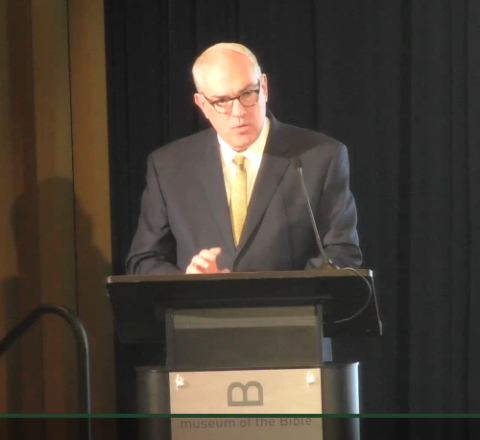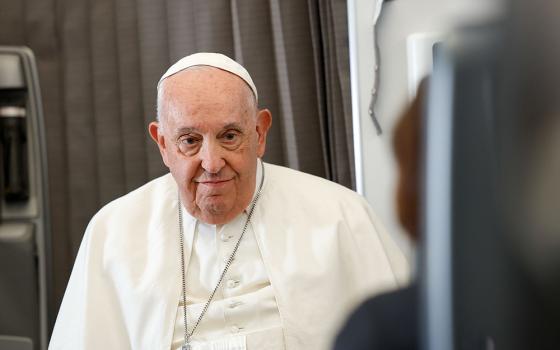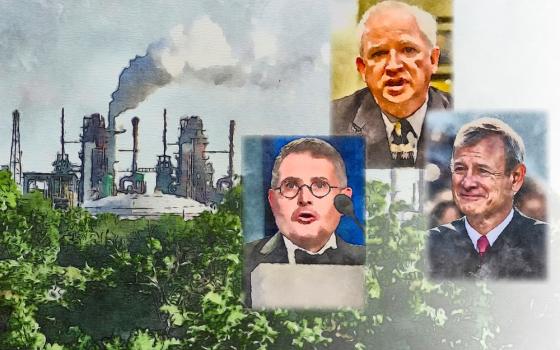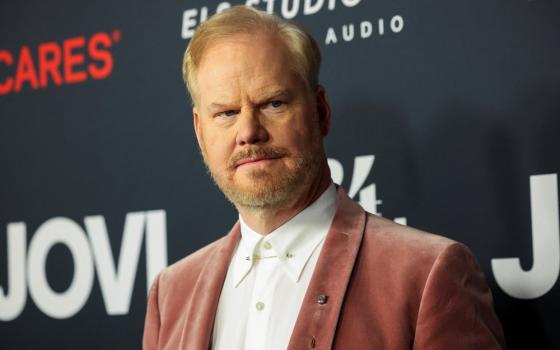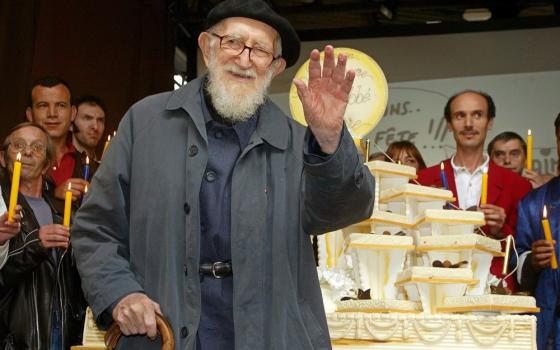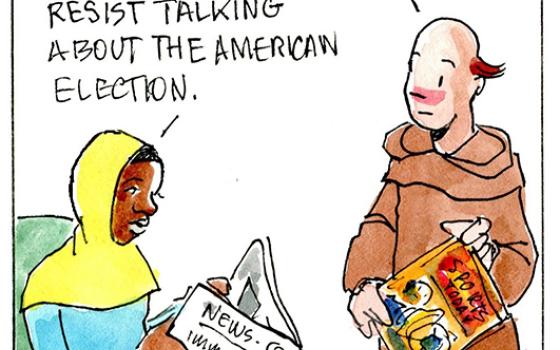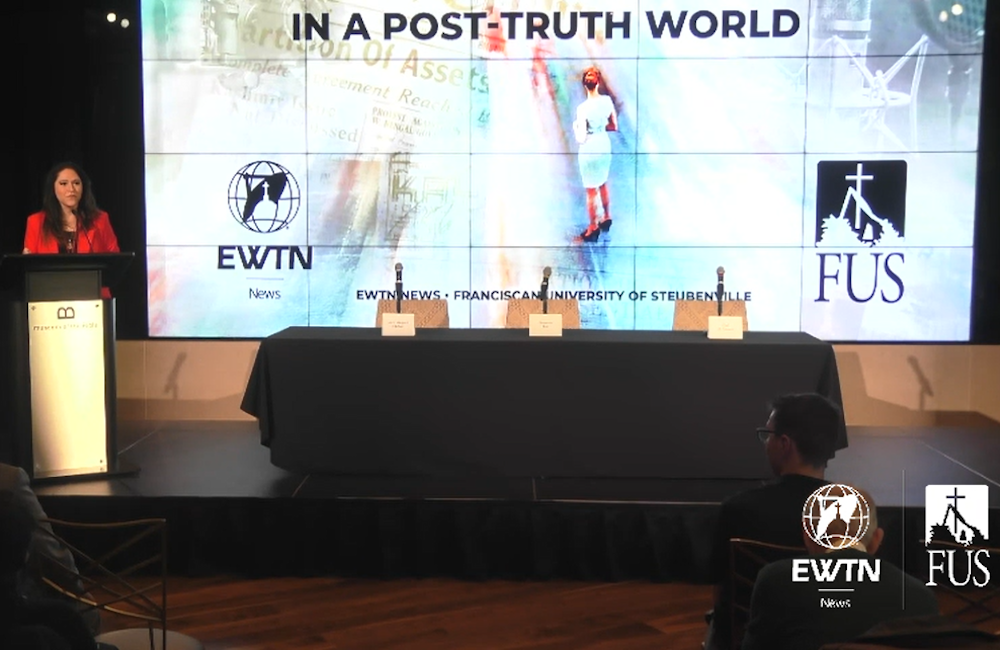
Montse Alvarado, president and chief operating officer of EWTN News, addresses the audience during the "Journalism in a Post-Truth World" conference, sponsored by EWTN and Franciscan University March 10-11 at the Museum of the Bible in Washington, D.C. (NCR screenshot)
Two Catholic institutions co-sponsored a conference last week where journalists from conservative news outlets and commentators from right-wing think tanks gathered at the Museum of the Bible in Washington, D.C., to weigh in on the state of journalism in a so-called "post-truth" world.
In keynote talks and panel discussions during the March 10-11 event, several speakers voiced longtime conservative criticisms of the news media, accusing journalists at mainstream secular outlets of being ignorant of religion, and hostile to Catholicism in particular. They described a news profession where reporters and editors promote legal abortion and "gender ideology" while marginalizing traditional religious voices.
"When it comes to news related to the church, and even religion in general, as we all know the issue of fake news is compounded by the fact that many in the secular media simply have little knowledge on religious subjects, and especially of the Catholic Church," said Michael Warsaw, the CEO and chairman of the Eternal Word Television Network, the conservative Catholic media conglomerate.
Advertisement
EWTN co-sponsored the journalism conference with Franciscan University of Steubenville. In his opening remarks, Franciscan University President Fr. David Pivonka said the polarized media landscape motivated him and others to organize a conference to discuss "what is the nature of journalism."
"One of the things I find frustrating is that we seem to live in a world where there is fundamentally nothing that is true," Pivonka said.
During the conference, several speakers described a "post-truth era" linked with the "dictatorship of relativism" that German Cardinal Joseph Ratzinger warned off in a homily on the eve of the conclave in 2005 at which he was elected Pope Benedict XVI.
As Warsaw articulated in his speech, the predominant view throughout the conference was that the secular news media, in tandem with "Big Tech" and cultural elites, rejects objective truth and obfuscates language to intimidate those "who accept biological or scientific reality, or who dare to express religious beliefs in the public square."
"The phrase [post-truth] goes hand in hand with what has come to be called woke ideology that tries to discredit and diminish the voices of others, even when what they are saying might actually be true," Warsaw said.
While the phrase was used academically before 2016, "post-truth" entered the public consciousness during Donald Trump's presidency when his aides presented "alternative facts" in news interviews and uttered obvious falsehoods about inauguration crowd sizes during White House press briefings.
Warsaw, who effectively endorsed Trump in a 2020 "Publisher's Note" he wrote for the EWTN-owned National Catholic Register, credited Trump with introducing the term "fake news" into the nation's "political and media bloodstream." Warsaw described "fake news" as a symptom of the post-truth era.
"Catholics only need to look around us to see the effects of the post-truth era in the discussions about abortion, gender, healthcare and religious liberty," Warsaw said.
Mary Margaret Olohan, a senior reporter with The Daily Signal, a conservative news site operated by the Heritage Foundation, voiced similar comments during a panel discussion titled, "What is a Journalist?"
"We live in a time when biological sex is disputed, when the protection of children's innocence is up in the air, when the dignity of human life is apparently up for debate, and when basic freedoms like the right to worship or just praying silently in our head are also disputed," she said.
Olohan accused news outlets like The Associated Press and The Washington Post of "activist reporting" for not writing in their coverage of abortion issues that abortion "ends the life of a human child."
In a "Bias in Journalism" panel, Tim Graham, director of media analysis at the Media Research Center, a right-wing media watchdog group, suggested that The New York Times and The Boston Globe reported on the clergy sex abuse scandals in the 1990s and early 2000s to undermine the church's moral authority and clear the way for same-sex marriage and "abortion on demand."
"This was their way of taking it to the enemy," Graham said.
"The journalists for EWTN, they're not searching for the truth. They've found the truth, and they want to communicate it."
— Montse Alvarado, president and chief operating officer of EWTN News
Other conference speakers and presenters spoke of the necessity of the press covering clergy sex abuse and other scandals in the church. Some panelists also touched on various challenges facing the news media, such as the industry's decline in advertising revenues and the pressure to appeal to readers by offering "clickbait" content that may not comport with traditional journalistic standards.
In that hostile media landscape, Warsaw said EWTN had been attacked "from the left and the right" and from "the highest levels of the church" for its reporting.
The network has often broadcast critical commentary of Pope Francis.
In 2021, Francis seemed to reference EWTN when he told a group of Jesuits in Slovakia that "a large Catholic television channel" was doing "the work of the devil" and hurting the church with its attacks on the pope.
"That couldn't be further from the truth," Jeanette De Melo, editor-in-chief of the National Catholic Register and a panel moderator, said of criticisms that EWTN is anti-Francis.
Montse Alvarado, president and chief operating officer of EWTN News, commended the reporters, editors, producers and others who contribute to the conglomerate's various Catholic news platforms in pursuit of "the one truth that changes your entire life should you choose to accept it; the reality of Jesus Christ our lord and savior."
"The journalists for EWTN, they're not searching for the truth," Alvarado said. "They've found the truth, and they want to communicate it."

